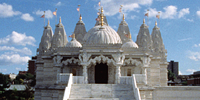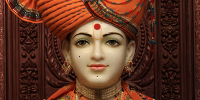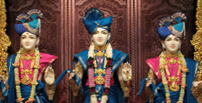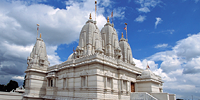FAQs
Click on any of the frequently asked questions listed below or scroll down to see their answers.
If you have a question that is not answered below, please feel free to ask us using the contact form here.
About Visiting
Do I need to book in advance to visit the Mandir?
I’m not a Hindu. Can I still visit the Mandir?
Are there any rules when visiting the Mandir?
How much does it cost?
About Booking a Visit
Do I need to book in advance to visit the Mandir?
How do I go about booking a tour?
How much would it cost?
Would I need to pay in advance or on the day?
What is the limit on numbers for groups?
What days would you offer the guided tour?
How far in advance would I need to book the tour?
About the Mandir
What does the word ‘mandir’ mean?
What is a mandir?
Who is the Mandir dedicated to?
What does the word ‘Swaminarayan’ refer to?
What does the name ‘BAPS Shri Swaminarayan Mandir’ mean?
Who built the Mandir?
How much did the Mandir cost?
Who paid for the Mandir?
Why do you need such an expensive and elaborate mandir?
Why do you need a mandir if God is everywhere?
What does the mandir represent? Is it just a fancy building?
What is a murti?
About Hinduism
What is Hinduism?
Who is the founder of Hinduism?
Who is a Hindu?
What are the main beliefs of Hinduism?
Why are there so many Gods in Hinduism?
What is the atma?
What is karma?
What is reincarnation?
What is ahimsa?
What does the symbol of Aum mean?
Why do Hindus use the Swastika?
Who composed the Hindu scriptures and when?
About the Swaminarayan Sampradaya
Who is Bhagwan Swaminarayan?
Swaminarayan was a social reformer. So why do you worship him as God?
You greatly extol the guru. Does this not undermine the greatness of God?
What is the way of life for a Swaminarayan believer?
What is the main scripture of the Swaminarayan Sampradaya?
About Visiting
Do I need to book in advance to visit the Mandir?
- If you are travelling in a group of 8 or more, yes, we would ask you to book your visit in advance using our online booking form.
- Individuals, families and groups smaller than 8 do not need to book.
I’m not a Hindu. Can I still visit the Mandir?
- Certainly. The Mandir is open to people of all faiths and no faith. Your visit can be an opportunity to learn about ‘the world’s oldest living faith’, or simply to see the art and architecture and enjoy the Mandir’s tranquil atmosphere.
Are there any rules when visiting the Mandir?
- We’re glad you asked. Yes there are a few. Please take a few moments to familiarise yourself with the guidelines provided here.
How much does it cost?
- There is no cost for the visit. However, there is a small charge for the ‘Understanding Hinduism’ Exhibition should you wish to include that as a part of the tour. And if you want a memento of your visit from the Souvenir Shop or wish to end with a traditional Indian vegetarian meal at the delightful Shayona restaurant across the road – be sure to bring some extra for that, too.
About Booking a Visit
Do I need to book in advance to visit the Mandir?
- If you are travelling in a group of 8 or more, yes, we would ask you to book your visit in advance using our online booking form.
- Individuals, families and groups smaller than 8 do not need to book.
How do I go about booking a tour?
- Please fill in and submit the online booking form.
- You may also find the guidelines on our Visitor Information and Booking Information pages useful.
How much would it cost?
- There is no cost for the visit. However, there is a small charge for the ‘Understanding Hinduism’ Exhibition should you wish to include that as a part of the tour.
Would I need to pay in advance or on the day?
- Paying in advance would be preferable, but you can also pay on the day.
What is the limit on numbers for groups?
- Anything less than 40 would be a comfortable number, though we appreciate that sometimes school groups have to be larger.
- With large numbers of children, we do advise that there be a suitable number of teachers or adult helpers within the group.
What days would you offer the guided tour?
- It is available every day.
How far in advance would I need to book the tour?
- People normally book about a month in advance, but even a week may be enough – depending on the season. Some periods can be fully booked, though, so it is best to book well in advance to avoid disappointment.
About the Mandir
What does the word ‘mandir’ mean?
- ‘Mandir’ is a Sanskrit name for a Hindu temple. It means a place where the mind becomes still and can engage with God.
What is a mandir?
- A mandir is a Hindu place of worship. In the ancient Indian language of Sanskrit, ‘mandir’ literally means a place where the mind becomes still and the soul floats freely to seek the source of life, happiness and meaning. It is a place where people can forget their differences and unite to serve God and society.
Who is the Mandir dedicated to?
- The Mandir is dedicated to Bhagwan Swaminarayan, the manifestation of the Supreme God and the founder of the Swaminarayan Sampradaya.
- To learn more about Bhagwan Swaminarayan, please click here.
What does the word ‘Swaminarayan’ refer to?
- ‘Swaminarayan’ refers to Bhagwan Swaminarayan – the manifestation of the Supreme God – and the sampradaya, or religious tradition, he established.
- To learn more about Bhagwan Swaminarayan, please click here.
What does the name ‘BAPS Shri Swaminarayan Mandir’ mean?
- In short, it means ‘the Hindu temple dedicated to Bhagwan Swaminarayan built by BAPS (Swaminarayan Sanstha)’.
- For a more detailed explanation, it’s best to explain each word individually, working backwards from the end:
- A ‘Mandir’ is a Hindu temple. In Sanskrit, the term means a place where the mind becomes still and can engage with God.
- ‘Swaminarayan’ is the name of the central Deity, Bhagwan Swaminarayan, to whom the mandir is dedicated. To learn more about his life, work and teachings, click here.
- ‘Shri’ is an honorific Sanskrit word meaning glorious or resplendent (having great beauty and splendour).
- And ‘BAPS’ – pronounced separately as an acronym, not a single word – refers to the organisation which built and runs the Mandir, called Bochasanwasi Shri Akshar Purushottam Swaminarayan Sanstha, or BAPS Swaminarayan Sanstha for short.
Who built the Mandir?
- The Mandir was built by BAPS Swaminarayan Sanstha (BAPS), a worldwide Hindu organisation rooted in the beliefs, values and practices revealed by Bhagwan Swaminarayan over 200 years ago and formally established by His Holiness Shastriji Maharaj in 1907. Specifically, the Mandir was made possible by the vision, inspiration and tireless efforts of His Holiness Pramukh Swami Maharaj, the fifth spiritual successor of Bhagwan Swaminarayan and the previous leader of BAPS.
- The current leader of BAPS is His Holiness Mahant Swami Maharaj, the sixth spiritual successor of Bhagwan Swaminarayan.
- To learn more about BAPS Swaminarayan Sanstha and its activities, please click here.
How much did the Mandir cost?
- The 3.85-acre complex – comprising of the stone mandir and the Haveli (cultural centre) with its assembly hall, gymnasium, library, classrooms, kitchens, offices, etc. – cost around £12 million.
Who paid for the Mandir?
- The Mandir was – and continues to be – funded entirely by the local community of worshippers and well-wishers. There has been no governmental funding.
- To learn about some of the fundraising initiatives used while the Mandir was being made, please click here.
Why do you need such an expensive and elaborate mandir?
- Everyone seeks a dream home for oneself and one’s loved ones. No cost or effort would be spared in pursuit of the perfect place. Hindus, as an expression of their devotion to their beloved God, similarly spare no effort or cost in endeavouring to make the perfect house for him. The elaborate features and exquisite carvings of the mandir are simply the physical expression of the inner devotion of the devotees who created the mandir.
- The government of every country spends millions from taxpayers’ money on public monuments. This expenditure is accepted and appreciated because such monuments promote national pride and values thought beneficial to the country. A mandir promotes peace, harmony, service, charity, integrity, and faith in God. Importantly, the money spent on mandirs does not come from public coffers, but solely from the selfless donations of devotees who desire to express their devotion to God through the mandir.
Why do you need a mandir if God is everywhere?
- God is certainly everywhere, but just as radio waves are everywhere yet cannot be experienced without the use of a receiver, similarly, a mandir helps people easily ‘tune in’ to God to receive his love, blessings and inspiration, and have rich and profound experiences of him.
What does the mandir represent? Is it just a fancy building?
- Every religion in its own tradition builds houses of worship. In Hinduism, these are called mandirs.
- Historically, mandirs have not just remained centres of worship, but have evolved into extensive complexes encompassing many roles to serve the special needs of society. In addition to their pivotal function in religious worship, mandirs have been a place where pilgrims and the poor have turned to for food in times of need or during natural disaster. Today, BAPS mandirs around the world are hubs of a wide range of community services, including child care, educational guidance, family values, sports, health awareness, and much more.
- For example, under the guidance of His Holiness Pramukh Swami Maharaj, the Mandir in London has been created as a place of:
- WORSHIP – where an incessant cycle of devotional rituals, ceremonies and practices are observed throughout the day, every day
- LEARNING – where young and old can engage with and learn about Hindu beliefs, values and practices to kindle a spiritually uplifting and fulfilling lifestyle
- CELEBRATION – where year-round Hindu festivals allow for vibrant and joyous celebrations for the whole community
- BEAUTY – where exquisite art and architecture are offered as a humble tribute to the inexpressible majesty and unbounded glory of the Divine
- COMMUNITY – where dialogue and understanding help foster greater respect, harmony and cooperation among people of different faiths, races, ethnicities and cultures
- CHARITY – where the selfless spirit of volunteerism reaches out to serve the wider community and contribute meaningfully to our country
- PEACE
- Mandirs also play an important role in the lives of many by providing peace, solace and meaning during times of personal and family need. Pramukh Swami Maharaj also often explains: Schools will educate the mind, but who will educate the soul? Hospitals will mend a broken arm, but who will mend a broken heart? Cinemas and arcades will excite the mind, but where will one go for peace of mind?
- To learn more about the significance of the Mandir, please click here.
What is a murti?
- A murti is a sacred image ritually infused with the presence of God by a God-realised guru. Hindus worship murtis to enhance and develop their loving relationship with the Divine. To learn more about the Hindu practice of murti puja, please click here.
About Hinduism
What is Hinduism?
- Hinduism is the oldest living religion in the world, and with almost a billion followers, it is also the world’s third largest religion. Originating from the vast Indian subcontinent, today it is spread across over 150 countries of the world.
- Hinduism, though, is not monolithic and has no one founder or central governing body. It embraces a ‘family’ of many diverse traditions, each with its own distinct theology, philosophy, rituals, code of practices and value system. This diversity makes Hinduism particularly hard to define in simple, precise terms. Nonetheless, like in any family, there are some common elements and unifying themes. These include accepting God or a Supreme Reality, atma (the soul), Dharma (the law of righteousness), karma (the law of cause and effect), the authority of the Vedas, and moksha (liberation).
- For a more detailed answer, please click here.
Who is the founder of Hinduism?
- Hinduism, traditionally known as ‘Sanatan Dharma’ (the Way of Eternal Truth, or the Eternal Tradition), does not have a single human founder. As the term suggests, Hinduism is a religion based on eternal truths. Indeed, the sacred Vedas, which encapsulate this eternal wisdom, were divinely revealed by God to the ancient rishis (sages). Thus, Hindus believe that the true founder of Hinduism is God himself.
Who is a Hindu?
- Generally, a Hindu is a person who accepts the main beliefs of Hinduism and espouses the basic values and ideals of satya (truthfulness), saucha (purity), daya (compassion), ahimsa (non-violence), and brahmacharya (continence before marriage and fidelity thereafter), among others. These values are practiced in daily living in various ways. For example, for many Hindus, part of a compassionate lifestyle would include a strictly vegetarian diet, and a life of purity would mean abstaining from all intoxicating substances such as alcohol and tobacco.
- While remaining faithful to these values and other scriptural injunctions, a Hindu regulates his/her life according to the four main endeavours of Dharma (righteousness), Artha (wealth), Kama (aspirations) and Moksha (liberation). That is, each Hindu strives to lead a righteous life, earn an honest living, fulfil one’s aspirations through one’s earnings, and ultimately, be liberated from the perpetual cycle of births and deaths.
What are the main beliefs of Hinduism?
- Despite the many diverse strands of Hinduism, most Hindus share some common beliefs. Here are just a few:
- There is one supreme, all-powerful loving God who is the ultimate creator, sustainer and destroyer of all things.
- God manifests on earth to revive Dharma and liberate souls.
- God is present in and can be worshipped through murtis (ritually-infused sacred images).
- The goal of human life is for the soul to be liberated from the perpetual cycle of births and deaths so as to remain eternally in the service of God in his transcendental abode.
- The guidance and grace of a spiritually enlightened guru is essential for an aspirant seeking liberation.
- For a more detailed answer, please click here.
Why are there so many Gods in Hinduism?
- Contrary to the common misconception, most Hindus believe in and worship one Supreme God. Yet in doing so, Hindus also acknowledge many other devtas, or divinities (often called simply ‘Gods’ or ‘gods’). These devtas perform various functions in the universe, but should not be confused with the one Supreme God who is the ultimate creator and sustainer of all things.
- One cause of confusion may be that Hindus of different languages, cultures and times assign different names and forms to their understanding of the one Supreme God. But many names for the one Supreme God does not mean that there are many Supreme Gods. This merely attests to the richness and magnanimity of Hinduism.
What is the atma?
- The atma, otherwise known as one’s soul, is the essence and life-force of an individual. It – Hindus believe the atma is neither male nor female – is distinct from one’s physical body and senses, and even one’s thoughts and feelings. Unlike the body, the soul is immortal and unchanging. It can take on a body of various forms (like wearing different clothes) as it passes through countless lives. The ultimate goal for each soul is to be liberated from this perpetual cycle of births and deaths and to earn an eternal place in God’s transcendental abode.
What is karma?
- Karma is the universal, unbiased and inescapable concept of ‘cause and effect’. It links each person to his or her actions and their corresponding fruits via God. Importantly, Hindus believe that God is the granter of the fruits of one’s deeds (whether good or bad), and so karma is not merely a mechanical law of action and reaction but a divinely ordered system which is infinitely fair. This reconciles the ideas of free will and fate.
What is reincarnation?
- Reincarnation – also called transmigration – is when, upon death of the physical body, the immortal soul is ‘reborn’ in (i.e. re-enters) another life-form. This cyclic process of birth, death and rebirth continues until the soul eradicates its ignorance and can be granted moksha (ultimate liberation).
What is ahimsa?
- Ahimsa is the principle of non-violence (or non-injury) which discourages not only harmful actions but also abusive words and aggressive thoughts. Underlying this principle is a profound respect for all life and the belief that God permeates all beings, including plants and animals. This principle is the basis for a compassionate lifestyle, which includes a vegetarian diet.
- The Hindu espousal of ahimsa, however, does not imply absolute pacifism. In certain cases where it is one’s duty to protect oneself and others, self-defence is a legitimate practice.
What does the symbol of Aum mean?
- Aum is one of the most auspicious symbols of Hinduism. ‘Aum’ is also a sound, composed of three syllables – ‘A’, ‘U’ and ‘M’. It is the primordial sound of creation from which all other sounds are said to originate. It is also one of the most auspicious mantras in Hinduism, and is often chanted at the beginning and end of prayers as well as in meditation.
Why do Hindus use the Swastika?
- “Swastika” literally means ‘well-being’. It is symbolic of good fortune and prosperity, and so is often found in doorways of homes and shops and used as decoration during festivals and ceremonies such as weddings. With its arms pointing equally in all directions, the swastika also symbolises stability and balance.
- Although they appear similar, the Hindu swastika has no connection with the official emblem of the Nazi Party, also called the Swastika. This misappropriation of an ancient and sacred Hindu symbol can be an inadvertent cause of confusion and strife. However, Hindus have never harboured anti-Semitic sentiments, and have historically befriended the Jewish community.
Who composed the Hindu scriptures and when?
- The Vedas are the most ancient and most recognised of the Hindu scriptures. They are not considered to be composed by an individual in the traditional sense. Instead, Hindus believe that the Vedas were divinely revealed to the ancient rishis (sages) by God himself. The rishis transmitted the teachings of the Vedas for generation upon generation using a precise oral tradition. These teachings were eventually committed to script by scholars many thousands of years ago. The sage Veda Vyas is said to have systematised or categorised the Vedas, though he is not their author. The Vedas are universally accepted as the world’s oldest religious writings, with some claiming their ideas to be more than 8,000 years old.
- Other Hindu scriptures, though more recent, have also passed through a similar process of divine revelation, oral transmission, and written composition.
About the Swaminarayan Sampradaya
Who is Bhagwan Swaminarayan?
- Bhagwan Swaminarayan is the manifestation of the Supreme God and the founder of the Swaminarayan Sampradaya.
- He took birth in northern India on 2 April 1781, at a time considered to be one of the darkest periods in India’s religious history. He incarnated to dispel spiritual ignorance and grant eternal liberation to countless souls. At the age of 11, he renounced his home to travel alone and barefooted around India on a spiritual journey. Seven years and over 7,000 miles later, he settled in Gujarat, western India. At the age of 20, he established the Swaminarayan Sampradaya and revealed a new tradition of Hindu thought. He ushered in many social and religious reforms and initiated 3,000 sadhus (ordained monks). His teachings were compiled as a scripture called the Vachanamrut. He was recognised and worshipped as God in his own lifetime.
- Swaminarayan’s work of spiritual and moral regeneration continues to this day through a succession of enlightened gurus.
- To learn more about the life and work of Bhagwan Swaminarayan, please click here.
- For a brief exposition of his theology, please click here.
Swaminarayan was a social reformer. So why do you worship him as God?
- It is true that Bhagwan Swaminarayan worked ardently in many ways to alleviate the pain and suffering of hundreds of thousands of people during one of India’s harshest periods in history.
- However, Bhagwan Swaminarayan’s purpose on earth was always spiritual. As he himself revealed: “While other avatars of God manifested to fulfil a certain mission, I have manifested to dispel the eternal ignorance of countless souls.” Indeed, among the many great spiritual works he inspired, the most significant is that he enlightened countless men and women, elevating them to the highest spiritual state of being brahmarup. This would not have been possible had he not been Purushottam (God Supreme).
- So the question should not be ‘Why do you call him God when he only served society?’ Rather, a more meaningful question would be: ‘Why did he serve society even though he was God?’ The answer is, simply, because of his selfless love and unrelenting compassion for all.
You greatly extol the guru. Does this not undermine the greatness of God?
- A famous verse from the Guru Gita, which is embedded in the Skand Puran, unequivocally states:
Gurur Brahma, gurur Vishnuh, gurur devo Maheshvarah |
Guruh sakshat Param Brahma tasmai shri-gurave namah ||
The guru is Brahma. The guru is Vishnu. The guru is Shiva.
The guru is God (Parabrahman) manifest. We bow to such a guru.
- Since the guru is the manifest form of God (i.e. God fully resides within the enlightened guru and works through him), it is in no way inappropriate for the devotee to praise him. As an analogy, by praising the queen, one does not belittle the king. Indeed, one praises the queen because of her relationship with the king. Similarly, the guru is extolled because of his intrinsic relationship with God, and so one is not belittling or undermining God, but rather praising God himself.
- It should be clear nonetheless that the guru does not replace God nor does he supersede him in any way. The guru remains, forever, a humble servant who leads the aspirant to the liberating grace of God.
What is the way of life for a Swaminarayan believer?
- Followers of the Swaminarayan Sampradaya observe the five vartmans (cardinal vows). This means they:
1) do not consume alcohol or intoxicants of any kind
2) do not eat meat or non-vegetarian items
3) do not steal
4) do not engage in illicit relations out of marriage
5) maintain purity of conduct
- More generally, followers also practice customs that express the higher ideals of dharma (righteous conduct as prescribed by the scriptures), gnan (knowledge of God and one’s true self), vairagya (detachment from worldly pleasures), and bhakti (devotion to God). These can include everything from daily morning personal puja (worship, prayers and meditation), scriptural study and fasting, to ghar sabha (family assemblies at home), darshan (visiting the local mandir), and seva (serving others).
What is the main scripture of the Swaminarayan Sampradaya?
- Bhagwan Swaminarayan wrote and inspired many important scriptural texts for the benefit of his devotees and those interested in leading a spiritually pure and fulfilling life.
- For followers of the Swaminarayan Sampradaya, the most important revelatory text is the Vachanamrut. It contains 273 sermons delivered by Bhagwan Swaminarayan which were compiled during his lifetime and also endorsed by him. The sermons offer a detailed exposition of the theology and spiritual practices propounded by Bhagwan Swaminarayan for members of the Swaminarayan Sampradaya.














